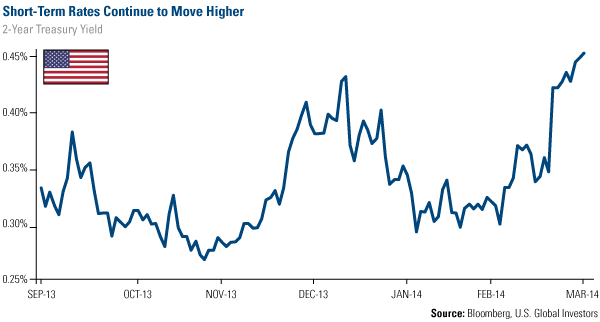The Economy and Bond Market Radar (March 31, 2014)
Treasury bond yields were mixed this week. The very short and very long ends of the yield curve experienced falling yields, while the belly of the curve saw yields move higher. The 2-year Treasury note is shown below and after a big move last week continues to creep higher as growth expectations continue to build. Short-term bond yields continued to adjust to last week’s comments from Fed Chair Yellen which spooked the market into thinking higher rates could be coming sooner than expected.
Strengths
- Fourth quarter GDP was revised higher to 2.6 percent as consumer spending and exports were better than initially estimated.
- Consumer confidence continued to improve as the Consumer Confidence Index reached a new multi-year high in March.
- The S&P/Case-Shiller Composite 20 City Home Price Index rose 13.24 percent on a year-over-year basis in January.
Weaknesses
- Manufacturing data was modestly disappointing with the Markit US Manufacturing Index falling more than expected along with somewhat disappointing core durable goods orders in February.
- Housing data continued to send mixed signals with pending-home sales falling 0.8 percent in February for the eighth straight monthly decline.
- German business confidence weakened in March as the Ifo survey weakened.
Opportunities
- The Fed will likely follow a data dependent path for monetary policy and this week’s testimony will likely be refined in coming weeks.
- The IMF released a report recently highlighting the deflation risk in Europe. It is exactly this type of thinking that could spur additional easing policies from the ECB, especially as the Euro continues to strength and is approaching the 1.40 level vs. the dollar.
- There are many moving parts to the taper decision and while the Fed began the process it is very possible that tapering could be delayed if the economy stumbles.
Threats
- Several Fed officials tried to reframe Fed Chair Yellen’s comments from last week that caught the market off guard with regard to how quickly interest rates may be adjusted. The potential for miscommunication from the Fed has increased with the change in guard.
- Trade and/or currency “wars” cannot be ruled out which may cause unintended consequences and volatility in the financial markets.
- China remains a wildcard for economic recovery and the economy has shown some cracks in recent months. This is similar to how last year started and China found its footing, something similar needs to happen this time around.
















